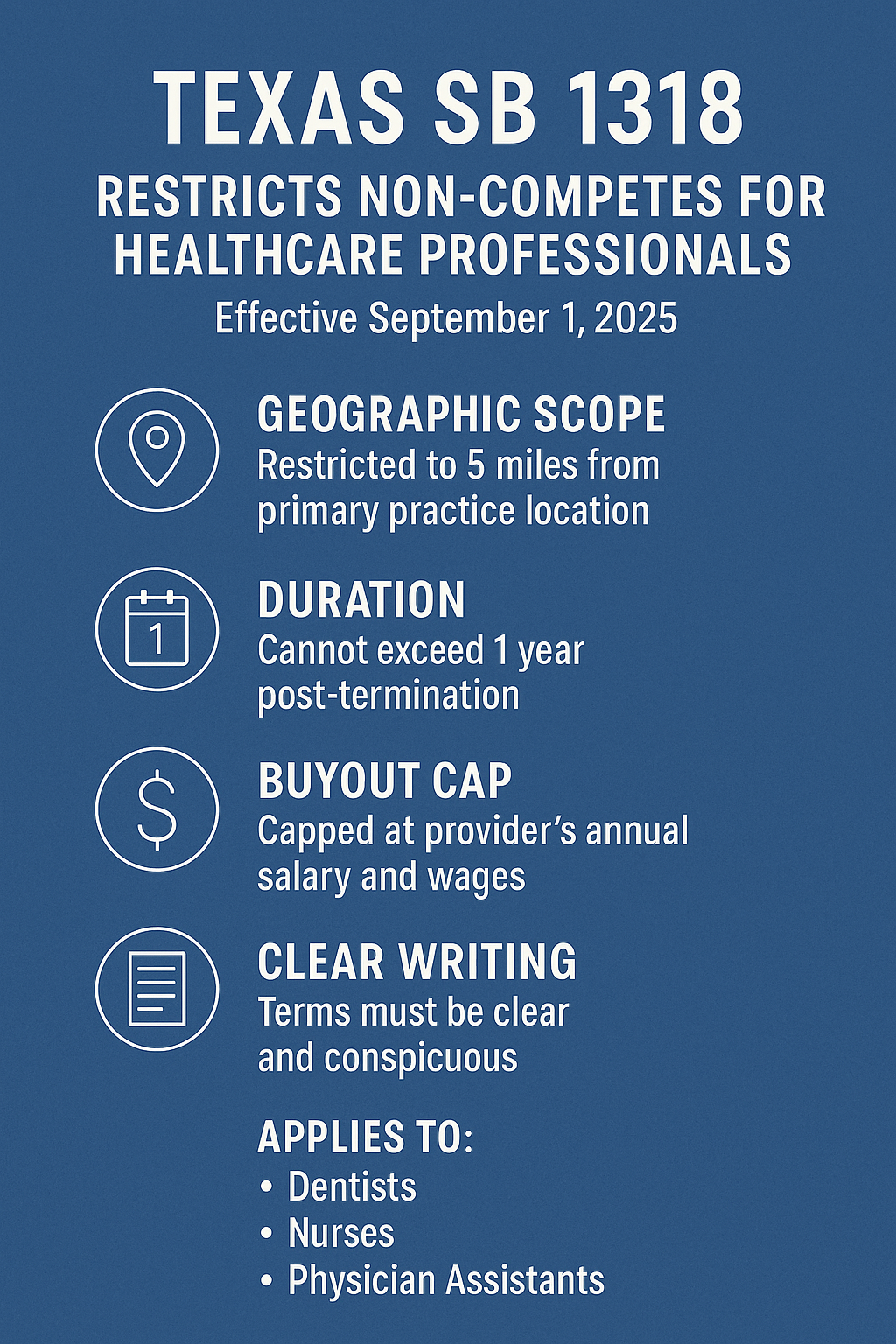Effective September 1, 2025, healthcare employers must comply with new statutory limits on restrictive covenants for certain providers, including dentists.
June 26, 2025
Senate Bill 1318, signed into law by Governor Greg Abbott, will bring sweeping changes to non-compete agreements in the healthcare sector starting September 1, 2025. While much of the attention has centered on new rules for physicians, the law’s reach extends well beyond doctors. Under new Section 15.501 of the Texas Business and Commerce Code, the statute imposes clear limitations on non-compete agreements with dentists, nurses, and physician assistants.
These changes reflect a broader legislative trend favoring healthcare provider mobility and patient access to care. Employers in Texas who use non-compete agreements to protect business interests will need to carefully reevaluate their contracts and related retention strategies.
Who Is Affected?
The new restrictions apply to non-compete agreements with:
- Dentists (licensed under Occupations Code Chapter 251)
- Professional and vocational nurses (Chapter 301)
- Physician assistants (Chapter 204)
Agreements entered into or renewed on or after September 1, 2025 must comply with the new requirements. Older agreements are not automatically invalidated, but courts may view them through the lens of this new statutory framework.
What Does the Law Require?
To be enforceable, non-compete agreements with the covered practitioners must include the following:
1. Geographic Limitation
The restriction must be limited to a five-mile radius from the practitioner’s primary practice location at the time of termination.
2. Duration Cap
The restriction cannot exceed one year from the date of termination.
3. Mandatory Buyout Provision
Practitioners must be given the right to buy out of the non-compete. The buyout amount is capped at the practitioner’s total annual salary and wages at the time of termination. This eliminates the prior “reasonable price” standard and prevents employers from requiring arbitration to determine the buyout value.
4. Clarity and Conspicuousness
All terms must be clearly stated and conspicuously written in the agreement. Vague or buried language may render the provision unenforceable.
Key Differences from Physician Non-Competes
Notably, non-physician providers do not receive some of the statutory protections granted to physicians under Section 15.50, such as:
- Access to patient lists and medical records post-termination
- Rights to continue care for patients with acute illness
- Automatic voiding of non-competes if terminated without cause
These distinctions mean employers must treat physician and non-physician agreements separately when drafting or updating contracts.
Next Steps for Healthcare Employers
To prepare for compliance with SB 1318, healthcare employers should:
- Audit existing agreements to identify those that may be renewed after September 1, 2025
- Update contract templates to include capped buyout clauses, enforceable duration/geographic limits, and conspicuous language
- Define “primary practice location” clearly in each agreement
- Consider alternative protections, such as non-solicitation clauses, confidentiality agreements, or retention bonuses
Conclusion
SB 1318 does not eliminate non-compete agreements in healthcare, but it does impose significant restrictions on their enforceability for a broad range of licensed professionals. Healthcare employers—particularly dental practices and multidisciplinary provider groups—should act now to review and revise their agreements before the law takes effect.
Nathanial L. Martinez is a business trial attorney with Palter Law Group who represents both plaintiffs and defendants in employment, real estate, construction, and commercial litigation in state and federal courts. He has extensive experience advising healthcare providers across Texas—especially dentists and orthodontists—on employment agreements, regulatory compliance, commercial lease disputes, and business fraud matters. Nathanial routinely advises clients on restrictive covenants, and has represented providers before the TWC, EEOC, TBDE, THHS, and other state agencies. For tailored guidance on SB 1318 or related matters, contact Nathanial directly.

